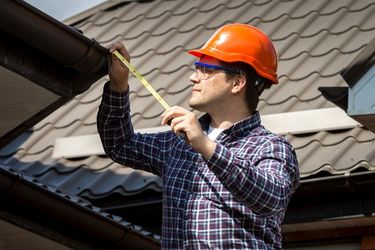
Written by Kayla Jane Barrie Updated on Nov 24, 2025 5 mins read

In some situations, you may be required to complete a home inspection to obtain your homeowner's coverage. If you are buying an older home, or your current one has not been checked in over 20 years, and you’re planning for renovations, you should consider an inspection.
Even though inspectors may vary in experience, a good inspector should examine key components and produce a report outlining what they found.
Here’s what you need to know about why inspections can be required and how to find a reputable inspector for your home.
Although a home inspection may not always be required, professionals are trained to focus on loss prevention. They help locate liabilities and safety concerns inside and outside of a house. Working with a qualified inspector can help determine the property's updated value and assess any areas that need to be updated or repaired. They can see what is currently wrong and what could go wrong in the future.
If you are a new customer or are investing in a home with an older build date, you may need an inspection. They usually happen 30-90 days after your home insurance begins. The insurer will specify if they need the interior, exterior, or both looked at.
The number one priority is to find any opportunities where safety or security can be improved. Inspectors will search for fire hazards and liability risks inside and outside your premises. If your home has water damage, mould, or structural damage, you will be advised on the best action to fix it. Other areas where they are looking include :
It’s important to note that a home inspection does not identify anything potentially wrong with a property. They take visual cues for potential problems.
Inspectors are known as generalists. They offer suggestions and recommendations for hiring an expert to fix and analyze the problem. If you have a specialized problem, seek a reputable expert in the field to help you repair or clarify the issue. Often they won’t check inside chimneys, electrical panels, pipes, sewers, or inside walls.
Although you may be tempted to skip it, here is why inspections are beneficial :
Keep in mind that home inspections can’t predict the future – problems may show up for years after the initial inspector does their report.
Being adequately prepared before an inspection can make the process an ease. Here’s how you can prepare :
After the inspection is complete, you will receive a detailed report of their findings and suggested timelines when repairs or updates need to be completed.
You may notice an increase or decrease in your home insurance in Ontario. Your insurer can provide a list of mandatory issues that need to be fixed. If your home is at risk and you do not make the suggested repairs, your coverage could be cancelled.

When you are looking to hire a home inspector, always look for one yourself. Although real estate agents will suggest some, you are not obligated to choose one from them. Check with family members and friends if they have any recommendations.
As of 2017, Ontario now requires home inspectors to have insurance and abide by a code of ethics. It is highly recommended to search from reputable sources such as the Canadian Association of Home and Property Inspectors and the Ontario Association of Home Inspectors.
If you are buying a condo, home inspections are still necessary, even if it is brand new. Scheduling an inspection for your condo or apartment can help identify issues such as :
Unlike a home inspection where a professional looks at the entire property, an inspection will critically study the stand-alone unit. Some inspectors will look at the entirety of the building (roof, air conditioning, garage) but often focus on safety within your space. If you have any individual heating or cooling units, you may be accountable for any updates or repairs before you move in. Don't forget to compare condo insurance quotes to ensure you are getting the lowest price and best coverage.
In Ontario, home inspections cost between $300-$500, depending on the house and property's locations, age, and size. Typically, the buyer is responsible for these costs, but if a seller is commissioned to have it done before selling, you can ask for a walkthrough with the inspector ($100-$150) or hire a new one.
They are not mandatory unless your insurer asks for one. However, buying a home without an inspection is risky because not all sellers will disclose issues, and others simply do not know. Having a third party is the best way to get an informed opinion. They may be especially important when you are seeking Toronto home insurance since the market is so competitive.
In Canada, a home inspection is not always necessary for you to get approved for home insurance. If your house is more than 25 years old, most providers will require proof of inspection.
Homeowners or real estate agents may require an inspection before putting the house on the market. It will show any flaws or damages that need to be done. It will educate buyers and sellers ahead of time if any work needs to be done. Buyers can book an inspection before the offer date to ensure there are no hidden repairs.
Even if you are buying new, a home inspection can help spot unexpected issues. It’s a good idea to have another set of eyes on the property before moving in to check water lines, electrical outlets, and crooked walls. Even if you’re the first owner, an inspection could help save you costs down the road.
If you received any recommendations to avoid claims or begin home renovations, read the suggestions carefully and ask the inspector and insurer any questions. In some cases, if you don’t complete the upgrades, your policy could be cancelled.
| Categories | Home |
|---|---|
| Tags | CondoProtect Your Home |
Read our insurance blog to get helpful tips, information and news.
Big changes are coming to Ontario car insurance. Starting July 1, 2026, many accident benefits will become optional. Learn how these "à la carte" reforms impact your coverage and why opting out could be a major financial risk.
Learn about Canada's new Electric Vehicle Affordability Program (EVAP). Discover how the $50,000 transaction rule works, which cars qualify, and how to claim your rebate.
Fatal collisions in Canada rose 9.14% from 2019 to 2023. Discover the latest road safety statistics, provincial rankings, and how these trends affect your auto insurance rates.
Find out if a seatbelt ticket will raise your car insurance rates and how insurers view seatbelt violations.